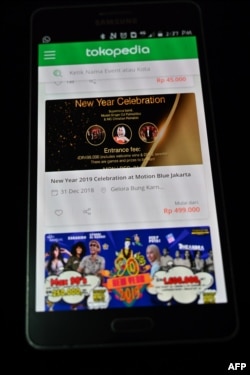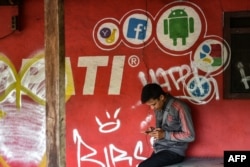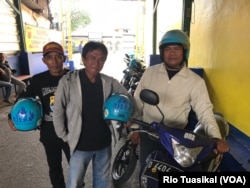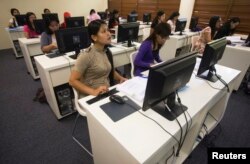With more than 140 million Internet users, Indonesia’s e-commerce industry has grown rapidly in the past decade, leading to calls for more government regulation in the sector.
“It’s a new industry so it’s growing very fast. [E-commerce] started booming in 2010 and since then some of the players that started during that time have become unicorns,” said the chairman of Indonesia E-Commerce Association (IDEA), Ignatius Untung, referring to startup companies that are valued above $1 billion.
The Indonesian Ministry of Industry estimates the value of the digital industry at $100 billion, and in 2020 the government expects it will increase to $130 billion.
Creating new unicorns
Untung said the consumer base for the e-commerce industry continues to grow as there are a continuously increasing number of Internet users in Indonesia, although they are still concentrated in the cities. In a market conducive enough for digital companies to thrive, Indonesia has managed to establish several unicorns.
One of them is Tokopedia, an online marketplace. In 2017, the startup company received a $1.2 billion investment from Alibaba, the massive online retailer in China. Priscilla Anais, the CEO Office Manager of Tokopedia, said the Gross Merchandise Volume or total sales value of goods sold through the marketplace has increased by four times in the past year.
“Now we have more than 90 million active users monthly and have reached 93 percent of all districts in Indonesia,” she told VOA via email.
But the value of Indonesia’s biggest online marketplace is still far below Gojek, a ride-hailing app, that has received $1.2 billion in investment from several companies, including Google and Tencent holdings. The Indonesian startup has a company value of $ 4 billion. Other unicorns include Traveloka, an online travel startup, and Bukalapak, an online marketplace.
Lack of regulation
Despite the digital economy in Indonesia growing rapidly and receiving support from the government, Untung said clear regulations are still needed. “For example for online payment, or e-wallet. There are players that have the platform and consumers but when they apply for a permit for e-wallet, it was declined. But there are others that don’t have the platform but received the permit. So we should make it clear, what are the criteria,” he said.
Untung also mentioned the issue of online ojek (motorcycle taxi). Motorcycle taxis are especially popular in big cities in Indonesia, such as Jakarta, where traffic is often congested.
The former Transportation Minister Ignasius Jonan, issued a notification letter in 2015 banning online motorcycle taxis.
But in December 2015, President Joko Widodo, said online transportation cannot be banned because people need it.
“With so many people using ride-hailing app, and motorcycle taxi, who can ban it now?” Untung said.
According to the Indonesian Consumers Agency Foundation (YLKI), 84 percent of Jakarta citizens use the service of online transportation.
Nevertheless, Untung lauded the e-commerce roadmap that was established through the Government Regulation No. 74/2017 under the Coordinating Ministry of Economic Affairs.
Samuel Pangerapan, the director general of informatics application at the Ministry of Communication and Information Technology said the roadmap was made to prepare an ecosystem that can transform the country to a digital economy era.
“We are addressing issues such as connectivity, infrastructure that can support digital transformation, and the regulations. President Jokowi has instructed us to conduct a study and find out all the things that can interfere with digital economy,” he told VOA.
Human resource remains a problem
Untung said one of the biggest problems many e-commerce companies in Indonesia are facing is human resources. “Supply is low, but demand is very high,” he told VOA. Untung added that some companies decided to import skilled workers from overseas or acquire companies to be able to use their service.
“So we’ve started to think how can we have good human resources. The association is thinking to start a vocational school, we also reach out to universities and tell the younger generation that a career in digital economy is possible,” he said. “A lot of young people still don’t know where they want to go after they finish high school. And many Indonesians are still thinking that becoming doctor, engineer, or pilot, is still the ultimate dream.”
Pangerapan assured that the government will also tackle the issue of a lack of skilled workers. “We definitely need to prepare a workforce that will be able to handle digital transformation,” he said.
Untung also mentioned that the e-commerce association has started a roadmap to provide better protection for consumers. The end goal is to certify e-commerce companies in Indonesia.
“So let’s say a grade A e-commerce is one that has enough resources, they have people to handle complaints and have a guarantee of service. And then we’ll start to educate the consumers, please shop at e-commerce that have better grades. After that we will encourage the players to improve their service,” he said.
He added that he has targeted the certification program to be launched in 2020.








